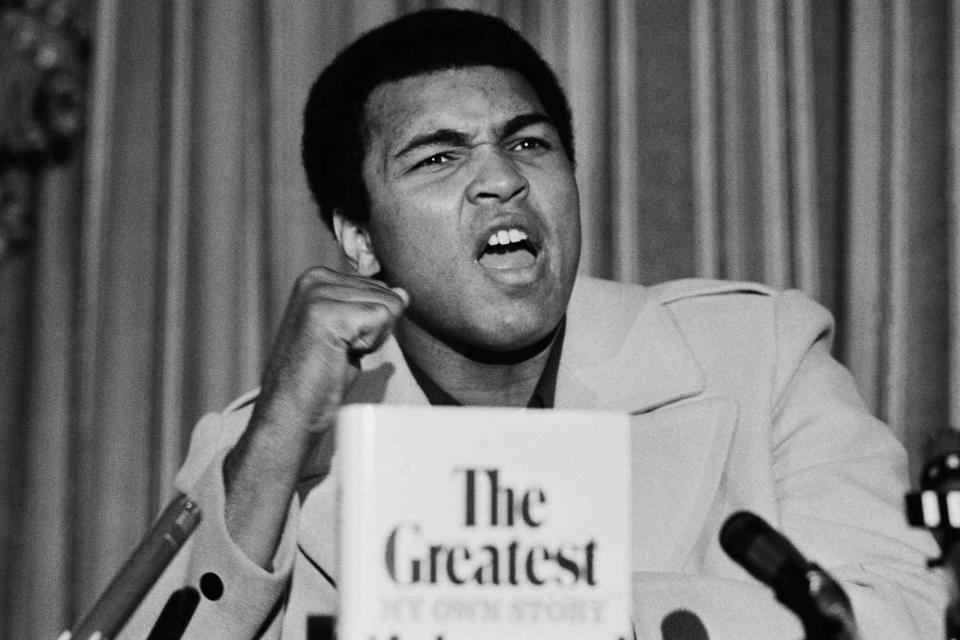New Book Examines How Trash Talk — and Muhammad Ali — Changed the Game for Athletes
Author Rafi Kohan says trash talk is "the language of competition"

Evening Standard/Hulton Archive/Getty
Muhammad AliTrash talk.
It’s the sport within the sport — and it’s often more entertaining than the one on the scoreboard.
The term didn’t come into vogue until the 1990s, but trash talk — alternately called talking smack, woofing, bench jockeying, among many other names — has been around since the beginnings of sports, if not the dawn of society.
Such is the assertion of author Rafi Kohan, whose new book, Trash Talk: The Only Book About Destroying Your Rivals That Isn’t Total Garbage, out now from Public Affairs, explores the art form. Trash talk, Kohan writes, “makes the outcome of a contest matter more than it otherwise would.”
Featuring interviews with more than two hundred people, ranging from professional athletes to linguists to comedians, the book pays homage to what Kohan terms the “language of competition."
Kohan, whose first book, The Arena, was a finalist for the 2018 PEN/ESPN Award for Literary Sports Writing, answered questions from PEOPLE in an email interview.
PEOPLE: Who was the best trash talker of all-time?
Kohan: Muhammad Ali, and not just because he told us he was the greatest. Ali is the godfather of modern trash talk and set the stage for trash talk, as we think of it today. He wasn’t the first athlete to be boastful or play competitive mind games. But he was the first to showcase almost all of trash talk’s various functionalities at the same time, and on a bigger stage than anyone before him.
Ali’s bravado and brash confidence grabbed headlines, earned him title fights, built hype, served as a means of self-motivation and wormed its way into the minds of his opponents. He was a showman and a competitor, and you can see his influence on every generation since.
Related: Muhammad Ali: Remembering His Incredible Life on What Would Have Been His 81st Birthday
PEOPLE: Who’s the most surprisingly good trash talker?
Kohan: One of the key goals of trash talk is to cause distraction. And one of the best ways to steal someone’s attention is in fact to be surprising—to say something unexpected or weird. Like a high-school wrestler whispering to his opponent at the start of a match, “Do you moisturize? You have really soft skin.”
But to me, the former NBA player Zach Randolph takes the cake. He would engage his opponents in small talk during games, asking about local restaurants or their off-season travel plans. And then, as they responded, he’d drive right by them for a layup.
Related: Larry Bird Wants Tattoos Removed from Indianapolis Mural That Portrays Him with Ink
PEOPLE: Are there different types of trash talkers? What are some examples?
Kohan: This is a good question, because trash talk can be used for many reasons — and talkers can use all sorts of tactics. Self-promoters, like Conor McGregor, adopt pro-wrestling styles, while pests, like Patrick Beverley or Reggie Miller, try to agitate, anger or distract opponents. Kevin Garnett, known as an intense and attacking bully, intimidated rival players. On the flip side, polite trash talkers, like Andrew Luck, might actually praise opponents, which could lead to downregulation or overthinking. Then there are the self-motivators — guys like Draymond Green or Gary Payton, who want their opponents to talk crap, because that ensures their own engagement in a game. Others, like Michael Jordan and Larry Bird, used talk trash to create little in-game challenges for themselves, or to imagine slights. They wanted to feel pressure, because they knew it’d bring out their best.
Never miss a story — sign up for PEOPLE's free daily newsletter to stay up-to-date on the best of what PEOPLE has to offer, from celebrity news to compelling human-interest stories.

PEOPLE: How has trash talk evolved?
Kohan: In America, we often think about trash talk as a relatively new phenomenon — a verbal gamesmanship that grew out Black oral traditions and was honed during the early days of hip-hop and on playground basketball courts. In reality, there’s nothing new about trash talk. It goes back to the bible and the Homeric poems, and maybe further. Humans talk trash. It’s simply part of who we are as competitive creatures.
Still, there’s something noteworthy about today’s trash talk. Thanks to the speed, scale and design of our technological and media ecosystems, trash talk — in the form of incivility — has never had a wider or more instantaneous reach. And that can have serious societal fallout, especially when you consider that it’s often our elected leaders who are talking the most smack.
Related: Michael Jordan's 5 Kids: Everything to Know
PEOPLE: Why is trash talk a legit sport in its own right?
Kohan: Trash talk is the language of competition — literally! — and it can be used as a tool of competition to gain a psychological edge. But more than that, trash talk can often become an arena of competition itself. This happened in the poetic insult contests that were a feature of the pre-Islamic Arabic world, in the old tradition of Scottish flyting and in many other places. Contemporarily, we see it in rap battles, roast battles and informal barroom and schoolyard games of traded insults. But wherever we find it, it’s important to remember that trash talk is, at its core, a test. It’s a way to ask someone, Can you handle this? And in that sense, trash talk is much less about what’s said than what comes next — it’s all about the response.
Trash Talk: The Only Book About Destroying Your Rivals That Isn’t Total Garbage is out now from Public Affairs.
For more People news, make sure to sign up for our newsletter!
Read the original article on People.


